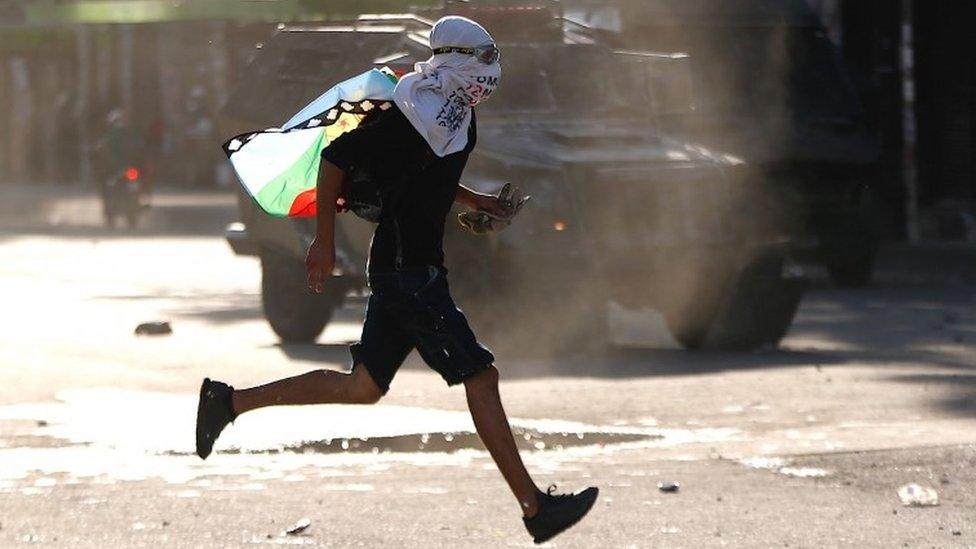'No middle ground': Chile voters face tough choice as run-off looms
- Published
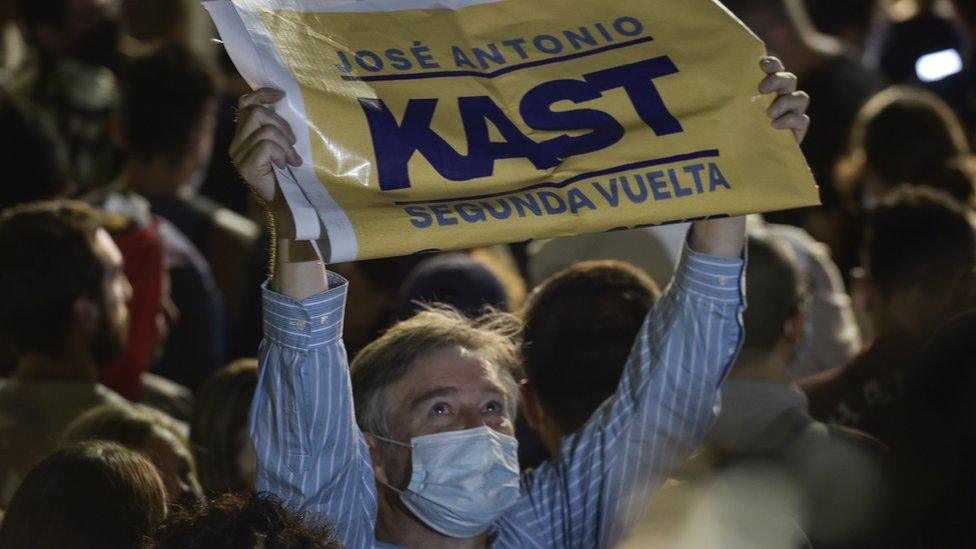
Supporters of José Antonio Kast hope he can win again in the run-off
"I didn't think that here in Chile we would see a repeat of what happened in the United States with [Donald] Trump or in Brazil with [Jair] Bolsonaro," says teacher and writer Viviana Ávila.
Ms Ávila is referring to the polarisation Chile has seen since left-wing former student leader Gabriel Boric and ultra-conservative former Congressman José Antonio Kast made it through to the run-off in the presidential election.
With the second round - scheduled for 19 December - pitching two politicians representing completely opposing stances against each other, debate among Chileans had become extremely heated.
One voter, Soledad González, told the BBC the first round had left Chileans "with the worst possible scenario, between Kast and Boric, with no meeting point in the middle".
Another said that she had never seen her country so deeply divided.
Polar opposites
Gabriel Boric, 35, first came to prominence when he led the marches for education reform which swept through Chile in 2012. He now heads a political coalition which includes the leftist Frente Amplio (Broad Front) and Chile's Communist Party.
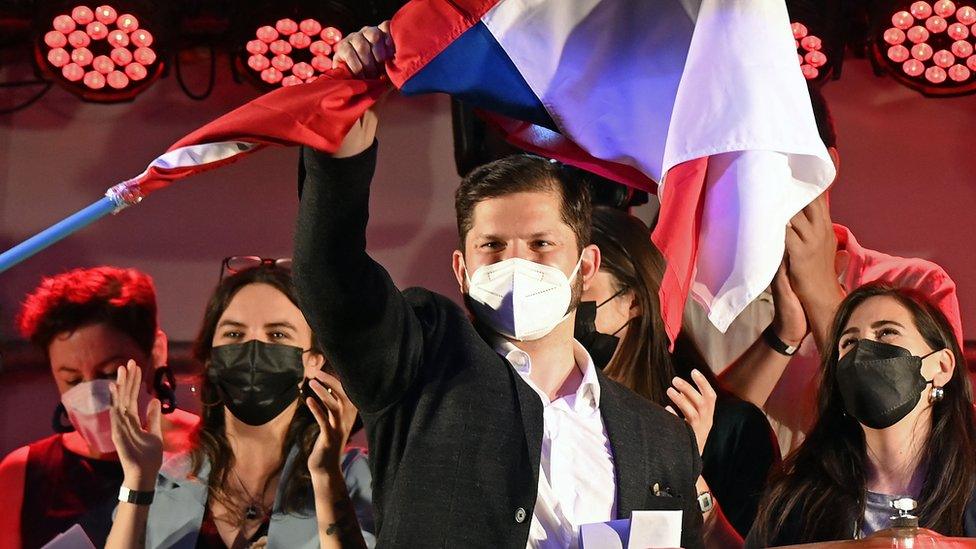
If Gabriel Boric wins the run-off, he will become Chile's youngest president
A progressive, Mr Boric wants the Chilean state to play a leading role in providing and guaranteeing social rights.
His rival, former Congressman José Antonio Kast, 55, is standing for the ultra-conservative Republican Party. Mr Kast wants the state to play a smaller role and is proposing to reduce taxes and regulations.
With immigration a hot topic, Mr Kast has also talked about the need for a "security barrier" to stop migrants from entering Chile. But he has denied being "ultra-right", arguing that left-wing detractors have labelled him as such in order to discredit him.
Rule of law
Mr Kast's tough stance on law and order has endeared him to voters like 57-year-old engineer Patricio Lira.
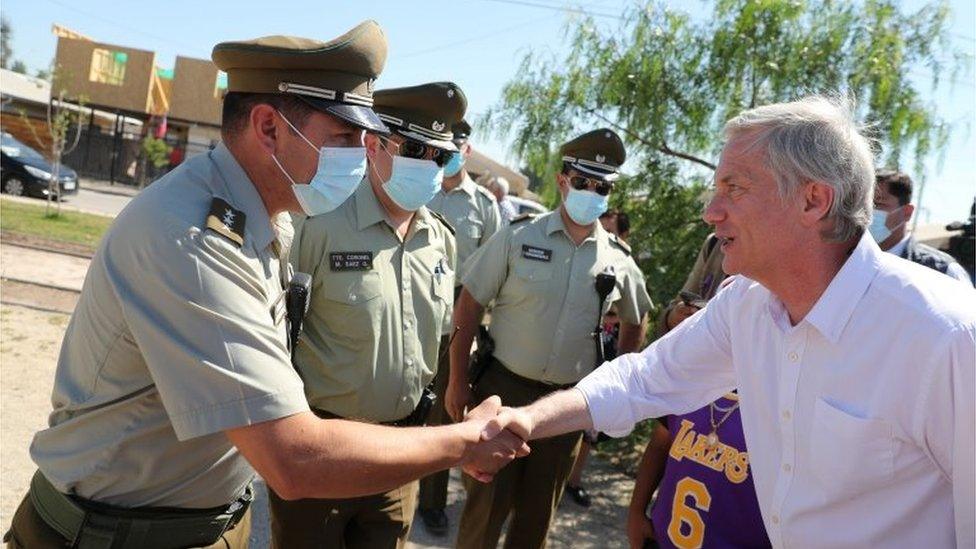
Mr Kast has taken a tough stance on immigration and says he will restore order
"The fundamental thing for me is that he talks about recovering social peace and the rule of law and safeguarding civil order," Mr Lira says.
Mr Lira is among many Chileans who do not want to see a repeat of the mass protests which paralysed the country in late 2019 and 2020, when millions of people angry at the country's high levels of inequality took to the streets.
"These protests last two or three days in other countries; here, there was looting, robbery," Mr Lira says about the violence that erupted.
"If someone proposes that authorities must restore order, people say that he's extreme right, dangerous. I say: how does burning a small store constitute a form of political protest?" Mr Lira asks.
Chile's 'historic' protest march from above
Mr Lira thinks that Mr Kast will have to "make concessions" and soften his more controversial views on issues such as women's rights, climate change and immigration ahead of the second round.
But even if he does not, "I'm going to vote for him, that's for sure", concludes the engineer.
The Pinochet factor
For voters like 56-year-old lawyer Claudio Castillo, Mr Kast is just too far to the right.
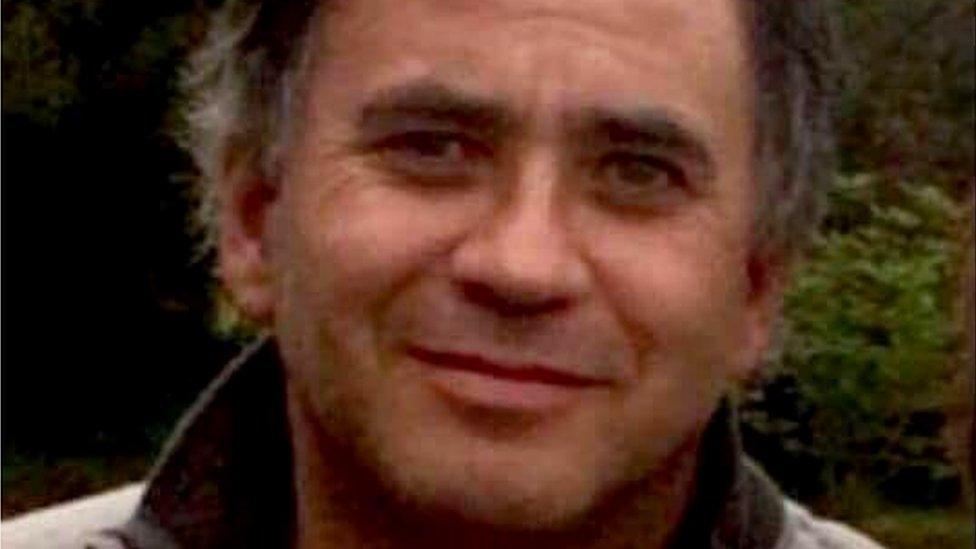
Claudio Castillo says that he would never cast his vote for Mr Kast
Mr Castillo belongs to a farming family and has been a Christian Democrat since he was 15.
He says that he would never vote for Mr Kast because of the candidate's sympathetic stance on Augusto Pinochet, the general who ousted Chile's elected president in a coup in 1973.
"I could not support with my vote - by action or omission - someone who supported Pinochet," Mr Castillo explains.
"This has never happened before, that we had a candidate from the extreme right and a candidate who - at least in the first round - was very left-wing, probably drawn in by the Communist party."
He insists that moderate political positions are needed now more than ever before but given the limited choice in the second round, Mr Castillo says that he is "going to choose the lesser evil".
"Boric wasn't and isn't my candidate. His government plans don't fully convince me. I don't even think that he is the best person to lead the country but in these circumstances, I am going to choose Boric."
Tears when Kast won
In Viviana Ávila's family, Mr Boric is not seen as the lesser of two evils.
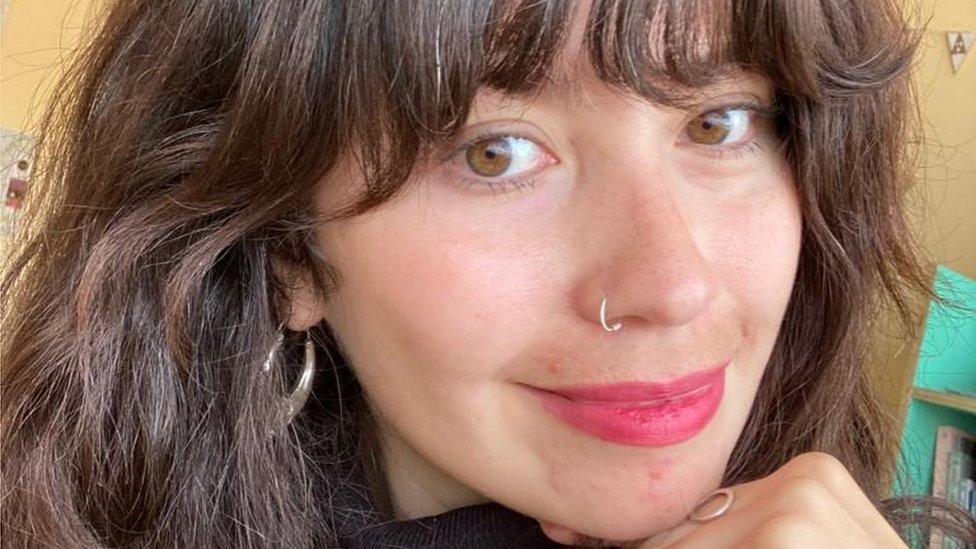
Ms Ávila is concerned that rights that women have achieved could be at risk
The 34-year-old says that every member of her family, including her 88-year-old grandfather, voted for the former student leader.
And when Mr Kast pulled ahead of Mr Boric in the first round, the family was shocked. "We watched the vote count on TV, and some began to cry," she recalls.
Ms Ávila is especially concerned about Mr Kast's position on women's rights, and says she will vote for Mr Boric again because "we can't put at risk the rights that we have so far achieved".
Mr Kast has been running on a platform of conservative family values and proposes to merge Chile's Ministry of Women with other ministries. He has also advocated giving married couples more generous state subsidies than single women.
"Everything we've built is at stake, from what the first Chilean feminists have done to today: the advancement in reproductive rights and the beginning of a public debate about unpaid care work," Ms Ávila argues.
Deep uncertainty
Soledad González voted neither for Mr Kast nor for Mr Boric in the first round. "My candidate was Sichel, and I lost," she says.

Soledad González is torn about who to vote for in the second round
Sebastián Sichel, the centre-right candidate, came fourth with only 12% of the vote.
Ms González says that all of her life she has been "inclined to the political right".
The 47-year-old married mother-of-two, who works to support her family, says that some have questioned why poor voters like her would back the right.
"I tell them that I do not consider myself poor, but working middle class." she explains.
"I have spent almost half of my life working. No government - on the right or the left - has given anything to me for free."
But, she argues, that she "can't turn a deaf ear" to Mr Kast's opposition to same-sex marriage and same-sex adoption and that she does not want a presidency "in which not everyone feels taken into account".
However, Ms González is not convinced by Gabriel Boric either, whom she sees as too fickle. "He says one thing one day, then he says another."
University graduate Pía Oliva Moscoso says Mr Boric "wasn't my first option either".

Pía Oliva's family has been having heated discussions about politics
But the 24-year-old is adamant that she will not vote for Mr Kast "because he does not represent me in any way".
Given the limited choice in the second round, she says she will cast her vote for Mr Boric.
Ms Oliva says that the election has been the topic of heated debate in her family in recent days. Her mother told her she could not bring herself to vote for either candidate.
Summing up the mood in Chile, the graduate says: "I think we all have this deep sense of uncertainty; that's why we fight and discuss so much."
Related topics
- Published19 October 2020
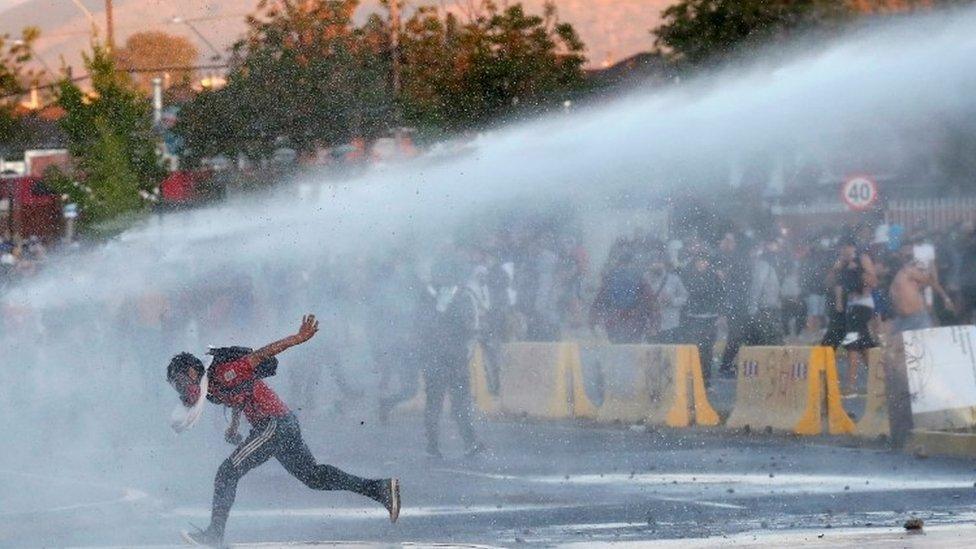
- Published21 April 2020
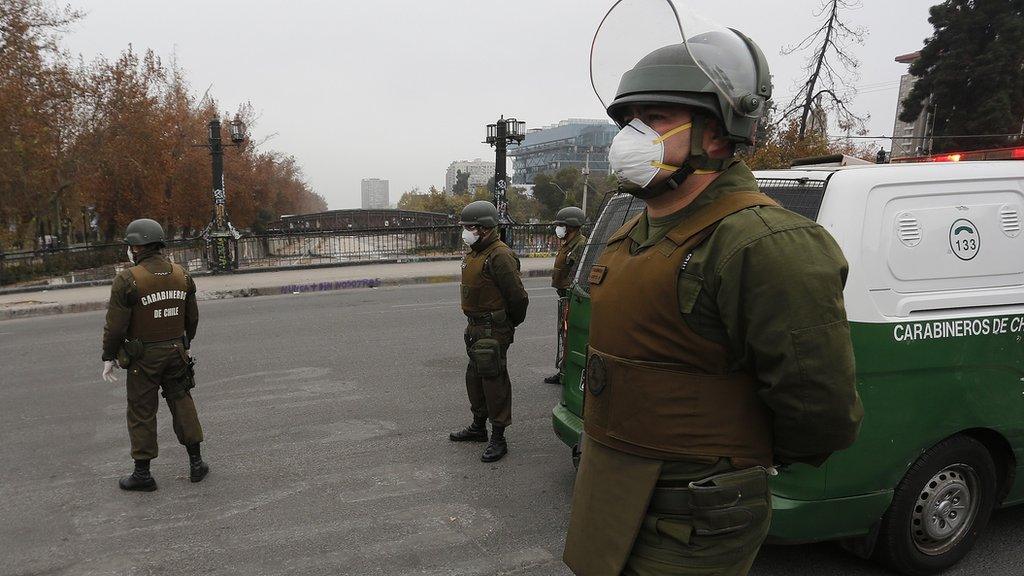
- Published13 December 2019
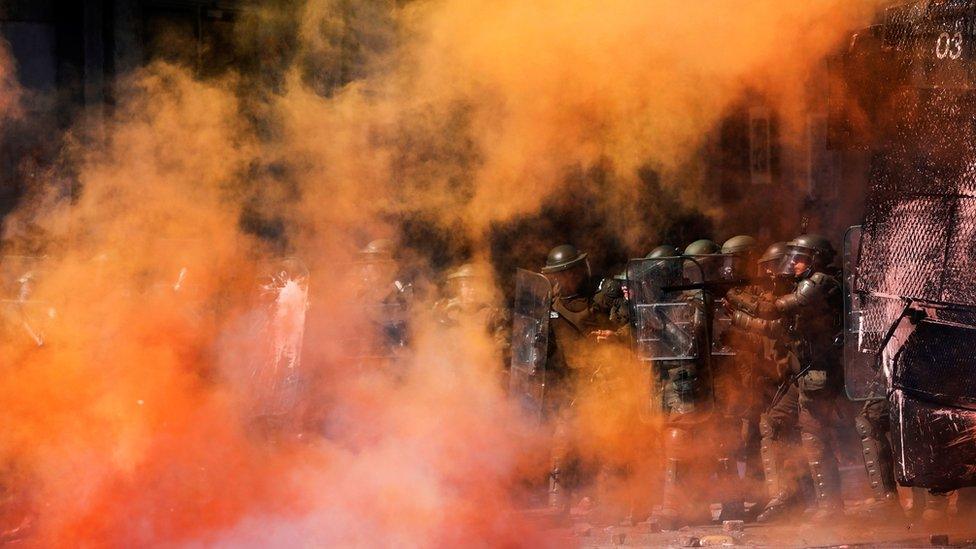
- Published21 November 2019
